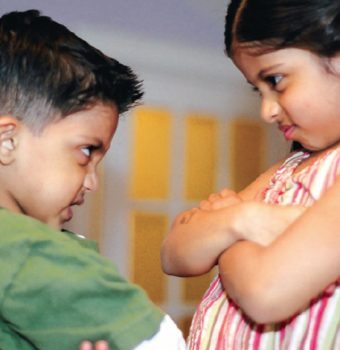
Are You Still Jealous?
Dad was seven years old when his younger brother, the baby of the family, was born. He was no longer the sole “heir” to the family fortune and would have to share his parents’ attention, as relatives and neighbours would unfailingly remind him. How was he to handle the newest addition to the family…friend or foe?
He may have been acting on instinct because to this day my uncle remains the favourite son, the apple of his parent’s eye. Despite the gap in years, there has always been an unspoken undercurrent of tension and competition between the two brothers. Many argue that jealousy or hurt feelings that occur between siblings in childhood is a passing phase, an essential part of growing up. But what if these feelings of resentment don’t pass and end up consuming your relationship?
Annaliese Singh, licensed professional counselor, says the root cause of sibling rivalry varies, but psychological research has demonstrated that the source of rivalry is often the result of insecurity.
“Sources of insecurity vary widely within South Asian families, especially surrounding areas of gender, class and religion,” Singh explains, “Often in my counseling work, I have discovered that the sources of family conflict and sibling rivalry come down to unrealistic expectations and/or strict gender roles established by parents. For instance, until we value girls in South Asian society by supporting the development of their full potential, the undervaluation of girls will lead those of the male gender to believe that the female mind and body isn’t her own and does not have worth. This type of inequality in gender roles allows abuse of all types to happen in South Asian families.”
Anu, a doctoral student with one brother, concedes gender roles are subjective to specific family situations.While her brother was the sole male child, she never felt as though she was treated any differently as the female child, nor did she ever harbour any animosity towards him or any extended family members.
She suggests that growing up away from cousins and extended family may have contributed to her confidence. “I have uncles who like to tell me how fantastic their kids are and how they are going to get them a Porsche when they turn 18, and all I can say to that is, ‘well, good for you.’ I really don’t care, I just wish everyone well.” She is unsure if her parents’ siblings have always been competitive with one another. “With my uncles, I don’t know if that’s what they were like as kids. Maybe they changed when they got married.”
Writer/educator Shaun Mehta says he grew up in his brother’s shadow, despite being the elder son. His reserved and cautious nature distinctively clashed with younger, more popular brother Richie’s rebellious streak. So much so that he pushed himself to excel in his studies, for himself, for his parent’s and to outdo his brother.
“All aunts, uncles and parents are always boasting about the accomplishments of their children, it’s natural.” He adds, “But this inadvertently creates rivalry between siblings and cousins. As a child I was always envious and jealous about the material objects or accomplishments that my cousins had that I didn’t. Why did they get music lessons and I didn’t? Why did they get to go to Europe and I went nowhere? I always wore the clothes discarded by my older cousins, I rarely got new clothes. Even though their clothes were always nice and new, it bothered me to some degree that I was wearing my cousins’ rejected clothes.”
While Mehta’s family may have been unaware of his feelings, there are cases when what is considered a “passing phase” spirals dangerously out of control. Singh warns that rivalry goes too far when a family isn’t functional because of the disagreements occurring. She argues that many view counseling as a “western” concept, and the need for such resources is ignored.
“The truth of the matter is South Asian families have a long history of working together to resolve conflicts, and our rich heritage demands that we seek the help that our families need to be functional – whether it’s counseling or another venue,” Singh advises.
She also says that adults need to increase their self awareness, as there may be ways we ourselves contribute to the situation or an environment that fosters sibling rivalry.
Mehta has been fortunate enough to pull himself out of filmmaker-brother’s shadow, and he believes that rivalry can at times be a healthy and positive force – when utilized properly. “In the past, I always did things to appease my parents. Richie was always doing things to appease himself; he didn’t care what my parents thought. I respected and envied his courage to stand up to them. My parents were always apprehensive about his career path until they saw his first movie, then they were extremely supportive. Thus, my rivalry with my brother turned into motivation. Because of my brother, I gained the courage to tell my parents what I wanted to do.”
His brother’s perseverance and hard work pushed Mehta to pursue his chosen path. “I’d see how hard my brother was working on his career, and I would be revitalized to finish my books,” he says. “Today, my brother and I support each other tremendously; we want the best for each other. And most exciting, we are working together on a feature length movie, Amal. It’s based on my short story, but we’ve both written the screenplay for the feature film together. Working on this project has brought us even closer, it’s been fantastic.”
WORDS JASMIN SANDHU
PHOTOS NRANA














































































































